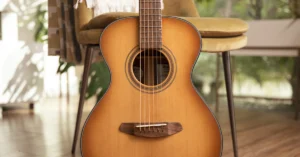Choosing the right string for your guitar is not as easy as it seems, as there are many options. The right kind of string will have the thickness and material that you need. Why? These are important for choosing the right one among all the strings available. Just think about your playing style and which guitar aligns with that. In this blog, tips about choosing the best guitar string are given for your help.
The Gauge of the strings you choose affects a lot of things, so consider that before selecting one. If we talk about durability and sound, choosing the right material is important. But don’t worry, you’ll know all about it after you’re done going through all the tips.
Table of Contents
ToggleWhat Are the Different Types of Guitar Strings?
Do you think all the guitar strings are the same in every sense? If yes, your mind is about to be blown after knowing all the different types of it. To sum it up, these things come in two types, that is, wound (w) and plain (p).
Roundwound Strings (w):
You must have heard of these, as they are pretty common with guitars.
- These kinds of strings play a bright sound as a round wire comes with it. You’ll find these wires wrapped around the core of the strings, which is interesting.
- As explained above, the thickness of the strings is important, which is found here in a lower way.
Flatwound Strings
These kinds of strings aren’t used that much compared to others, but are still good. These can be used for specific styles of music, as these strings can’t be used for all.
- The sound produced by these is soothing, so choose this one if you prefer that. It’s made with a wire that’s flat and wrapped around the core of the strings, which is not bad at all.
- It can only be used for some types of music, like jazz, as it sounds different.

Plain strings (p)
For electric and acoustic guitar, this one is your best pick as it’s suited for both.
- In these, there’s nothing wrapped around the strings. You’ll only find a wire which is made of metal, but it’s still goated.
- These things are a little thinner than others in a higher way. You can easily do big blends with these strings on the guitar, which is what it does.
- You can also use it on many instruments, like banjos, as it’s suited for them.
What Are The Different Guitar String Materials?
There are many string materials used in the production of guitars, where some are more common than others. The techniques of production are also different.
- Steel: This material is the most used on guitar strings due to the snappy sound it makes. The core of most wound strings has this material, so it’s common.
- Nickel-plated: This one is another material known for its popularity among guitar strings.
- Nylon: This one is used on classical guitars for the sound it makes, which is warm.
- Phosphor Bronze:For acoustic guitars, you can go for this material as it’s suited to them. It’s a wound one with a bell-like sound, which is interesting.
- Coated: Are you wondering what these are? This material is used on strings to protect them from any dirt or sweat, so they’re a good option.
Which String Gauge (Thickness) To Consider?
- Light Gauge:The light ones are good for beginners in guitar playing, especially if you want a light touch. This is great if you want to blend, as the sound is bright with less volume.
- Medium Gauge:If you want to experiment with different genres, a medium one would be suited. It has a tone to play the guitar playfully, so go for it if you want that.
- Heavy Gauge:If you want more volume, choose this for rock or metal music. Blending can be hard with this one, but it has a fuller tone.
- Extra Light Gauge: Beginners can go for this Gauge as it’s super light, especially for smaller hands.
Which String Gauge for Which Guitar?
For both electric and acoustic guitars, selecting the right Gauge can be hard, but not now.
Electric Guitar Strings
These kinds of guitars mostly have some standard packs for the Gauges, which are as follows:
- Extra Light: There is an extra light Gauge available for light-handed people in Electric guitars, which is geared. If you’re heavy-handed, don’t go for this as it might sound out of tune for you.
- Light: This one is suited for people who want to do bending, so if that’s you, try these.
- Medium:
If you want to play some rhythm, then go for these medium ones.
- Heavy:
Bending a full tone can be hard in this one, but go for it if you like challenges.
- Extra heavy:
No joke, this one is hard for most, except for some players in music. But if you’re a metal player, this one is for you.
Acoustic Guitar Strings:
For an acoustic guitar, many Gauges are available for the strings, so go through them. Heavier strings suit these types of guitars more, for the way they are. The sound in the heavier ones is louder and fuller, so go for those if you want. Lighter ones, on the other hand, sound delicate, which gives a different vibe.
- Extra light
- Light
- Medium
- Heavy
How To Choose the Right Guitar Strings?
To choose the right one among all, your guitar matters in the way you play it. Your finger strength also matters for choosing the right string that suits it. Gauge is actually the most important thing because the material depends on the instrument.
- If you’re a beginner in all this and don’t know what to choose, go for the extra-light gauge.
- If you’re into lead guitar, go for light gauge ones as they’ll suit you.
- For some variety, medium gauge strings are what you should choose.
- If you’re taste in music leans towards rock or metal, go for the heavy one.
Extra Tips
- You can note down what you feel about the strings through a record.
- In case you ever want to replace it, keep the string packaging in the guitar case.
Conclusion
If you want to know which kind of string to choose for your guitar, the decision is easy now. This blog has talked about the right materials and gauges to consider before choosing one. So, don’t think too much, as it’s not even that hard of a decision now. It depends on you, so just choose the one that feels right after reading this blog.
Frequently Asked Questions
Q – Which gauge to go for if I’m new to music?
A – If you’re new, go for the extra light as it’s suited for beginners.
Q – How to maintain guitar strings?
A – To maintain guitar strings, swap them every three months so they last longer.
Q – Does the quality of those strings matter?
A – Yes, it does because strings of bad quality just won’t work the way a good one would, so think of this.
Q – Which material is the easiest to play for strings?
A – The answer to that would be Nylen, as the material is easy on the fingers.




